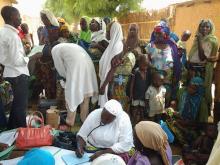Contribution to Global Vaccine Action Plan: WHO Nigeria leaves no stone unturned
Abuja, Nigeria 24 June, 2014 - Poised towards the total realization of the vision enshrined in the Global Vaccine Action Plan (Decade of Vaccines, 2011–2020) in which all individuals and communities enjoy lives free from vaccine-preventable diseases and the full benefit of immunization to all people through equitable access to immunization as well as utilizing the immunization systems for delivery of other primary health care delivery programmes, WHO country office in Nigeria is supporting the Federal Ministry Health to address the issues of health inequities in the underserved communities where often, the population immunity for polio is inadequate.
Accordingly, implementation of plans has commenced in selected hard- to- reach (HTR) settlements in the Very High Risk (VHR) States of Bauchi, Borno, Kano and Yobe (states that accounted for 84% of WPV in 2013) for the provision of immunization to contribute towards interruption of polio transmission and other child survival and maternal interventions that include ante-natal care services, Vitamin A supplementation, nutritional supplements, anti-helminthes, provision of bed nets and diarrheal medications.
Analysis of the 2013 wild polio virus (WPV) cases revealed that 48% of the 50 polio cases were amongst HTR and rural populations. In addition, 18 of the 46 (39%) caregivers of the WPV cases interviewed mentioned ‘health workers not visiting the household and hard-to-reach health facilities (>4 kms from the community)’ as reason for missing children.
The WHO Country Representative Dr Rui Vaz, who elaborated on the objective of the project, explained that the renewed focus on the under-served populations will put to rest, ‘lingering suspicions about undetected transmission of WPV cases in the hard-to-reach under-served areas.’ He further added that It would foster greater coordination between immunization and other programmes thereby strengthening human resources, supply chain and logistics components of health systems within the Global Vaccine Action Plan (GVAP). Put differently, the project will also optimize the Polio legacy to achieve other public health objectives.
Furthermore, Dr. Vaz who reasoned that, while the country is making tangible progress in its Routine Immunization (RI) coverage, the populations in the HTR areas may not have benefited equally from the implementation of the mobile outreach strategy of Reaching Every Ward (REW) also expressed WHO’s gratitude to the Bill & Melinda Gates Foundation (BMGF), for funding the initiative and noted that ‘the HTR Project’s strategy of using the mobile outreach services will provide the much needed vaccines and health services for children and women’.
Prior to the roll-out, the National Primary Health Care Development Agency (NPHCDA) and the Emergency Operations Center (EOC) provided valuable inputs into the design of the project which the Executive Director Dr. Ado Mohammed introduced to the states as well as under-scored its importance in strengthening routine immunization to contribute towards polio interruption in the country.
Consequent upon an elaborate baseline assessment of the HTR settlements, micro planning and buy-in from States and LGAs, the introductory sessions of the mobile health strategy were rolled out in 32 Hard to reach settlements in 8 LGAs of Kano state as from the 3rd week of May 2014. This integrated health care package was received with much exhilaration by the communities. At the end of the sessions, 2,908 under-fives were vaccinated with tOPV, of which 954 were zero doses. Also, 154 under-ones received BCG and Hepatitis B immunizations while 412 and 50 received Penta1 and 3 respectively. Additionally, 96 eligible infants received both Measles and Yellow fever immunizations.
In the same vein, vitamin A supplementation and deworming were administered to 2,294 and 1,636 eligible children respectively. As well, 1,862 children had nutritional screening with 6% (112) acutely malnourished and referred to nearest nutritional therapeutic center. Furthermore, 965 pregnant mothers were provided with antenatal care, with 9,484 women of child bearing age are receiving health promotion messages on key household practices.
The mobile health strategy is currently implemented in 2311 HTR settlements across 314 wards of 67 LGAs in targeted states of Bauchi, Borno, Kano and Yobe; which would be visited once every quarter for 12 months in the first instance.
Due to their inaccessibility and serious additional health needs, the larger package of basic health services, to cover essential child and maternal health will be provided by 65 mobile health teams; comprising of midwives, senior community health works and health record assistants.
It is instructive to note that, the WHO surge capacity has been pivotal to the successful take-off through active provision of technical support during planning, microplans, training, implementation and monitoring of the HTR project.
__________________________________________________
For more information, please contact:
Charity Warigon, Communication Officer
Tel: +234 810 221 0093

